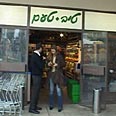

The man, dressed as a haredi, arrived Monday afternoon at a store belonging to the non-kosher Tiv Taam supermarket chain in the city of Bat Yam, just south of Tel Aviv. Upon his arrival, he undressed and remained with only a sock covering his private parts.
The man explained that he could not be prosecuted for an indecent act in public, because according to the court's interpretation of the leavened food law, a supermarket is not considered a public place. He even wrote on his stomach, "This isn't public???"
The store employees alerted the police, who dressed the man, arrested him and took him to the police station. In his investigation, the suspect claimed that he was a yeshiva student studying in different yeshivot in Bat Yam.
He told the police that in light of the court ruling, he did not violate any law. The police were unconvinced by the young man's interpretation of the ruling, and are expected to ask the Rishon Lezion Magistrates' Court to send him to a mental observation.
'I left sock on because I'm religious'
"I don’t know if they plan to prosecute me, but I plan to demand it. They opened an unjustified criminal record, and I plan to fight for my innocence," the young man, Arieh Yerushalmi, told Ynet on Monday night.
He explained his decision to strip despite his religious values, saying that "this is why I left the sock on, that's what I didn’t care. Sometimes one has to shout – the shame was not mine, but the other people's."

The writing on the stomach: 'This isn't public???'
Yerushalmi said that he entered the Tiv Taam store in Bat Yam's industrial zone at 2:20 pm. He noticed a group of minors and waited for them to leave. After they left, he said, he called the police and reported that there was a nude person in the store. He then walked over to the bread counter and took all his clothes off, apart from a sock covering his private parts.
Following his arrest and investigation, Yerushalmi was put under house arrest. He claimed that he was released because the establishment was not interested in a "media party" at the courtroom.
Yerushalmi told Ynet that after he undressed, there were several girls who laughed, while the store manager and guard demanded that he leave the premises. When the police arrived, he got dressed and went out.
Why did you do it during the holiday of all days?
"I wanted to do it a week ago, but I was lazy for different reasons. Now, during the mid-holidays, I'm free."
And how did you friends and family react?
"I got home half an hour ago and am not answering phone calls. I guess they don’t see things like I do."
What is considered a public place?
Several weeks ago, a Jerusalem Municipal Court judge decreed that the indictments against four restaurant owners charged with selling bread and leavened goods on Passover be scrapped.
In her verdict, Justice Tamar Bar Asher-Tzabann ruled that, by law, a store or restaurant is not deemed a public place because, unlike an open market, it is a closed off arena that cannot be seen by passersby. She said that leavened goods may be sold inside stores and restaurants, as long as they are not put on display outside or at the shop window.
About two weeks later, Attorney General Menachem Mazuz published a legal brief endorsing the court ruling. Mazuz noted that the State Prosecutor's Office did not intend to appeal the controversial ruling, as it fell in line with the State's stance.
He stressed that this stance in no way constituted a change in policy, on the contrary: "This has been the State's consistent policy over the years."
Roni Gal contributed to this report















